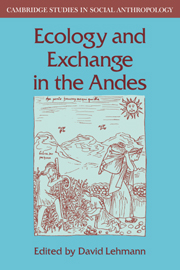Book contents
- Frontmatter
- Contents
- List of contributors
- Acknowledgements
- The Andean region: relief
- The Andrean region showing ecological levels (after Troll 1968)
- 1 Introduction: Andean societies and the theory of peasant economy
- 2 The role of the Andean ayllu in the reproduction of the petty commodity regime in Northern Potosí (Bolivia)
- 3 Labour and produce in an ethnic economy, Northern Potosi, Bolivia
- 4 ‘Resistance to capitalism’ in the Peruvian Andes
- 5 Production and market exchange in peasant economies: the case of the southern highlands in Peru
- 6 The Andean economic system and capitalism
- 7 Property and ideology: a regional oligarchy in the Central Andes in the nineteenth century
- 8 Multi-levelled Andean society and market exchange: the case of Yucay (Peru)
- Glossary
- References
- Index
- Cambridge Studies in Social Anthropology
7 - Property and ideology: a regional oligarchy in the Central Andes in the nineteenth century
Published online by Cambridge University Press: 29 September 2009
- Frontmatter
- Contents
- List of contributors
- Acknowledgements
- The Andean region: relief
- The Andrean region showing ecological levels (after Troll 1968)
- 1 Introduction: Andean societies and the theory of peasant economy
- 2 The role of the Andean ayllu in the reproduction of the petty commodity regime in Northern Potosí (Bolivia)
- 3 Labour and produce in an ethnic economy, Northern Potosi, Bolivia
- 4 ‘Resistance to capitalism’ in the Peruvian Andes
- 5 Production and market exchange in peasant economies: the case of the southern highlands in Peru
- 6 The Andean economic system and capitalism
- 7 Property and ideology: a regional oligarchy in the Central Andes in the nineteenth century
- 8 Multi-levelled Andean society and market exchange: the case of Yucay (Peru)
- Glossary
- References
- Index
- Cambridge Studies in Social Anthropology
Summary
Introduction
This chapter will focus on a group of families who constituted the oligarchy of Tarma, a province in the Peruvian Central Andes, during the nineteenth century. It explores the relationship between these families and their haciendas in a period when links with the wider economy and society were being re-established after the chaotic years which followed the end of Spanish rule. The argument will suggest that it was impossible in practice for these families to institute an easy or thorough transition from the regional socioeconomic system that had become entrenched under early republican conditions to one permitting a sustained expansion in the production of goods for an external market. As a result of this inability to inaugurate change, the economic position of the established oligarchy was weakened. I hope to throw some light on how and why a regional oligarchy became so vulnerable and lost the control it had previously exercised over particular resources in the province. This was the first stage of a process taking place in an increasingly dependent economy in which the most important cash-earning resources were acquired directly by foreign capital.
I will begin by outlining the historical background, physical environment, population distribution, agrarian structure and composition of the Tarma oligarchy.
- Type
- Chapter
- Information
- Ecology and Exchange in the Andes , pp. 191 - 210Publisher: Cambridge University PressPrint publication year: 1982
- 19
- Cited by



